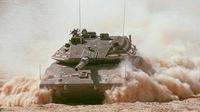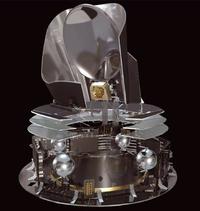-
Precise Biometrics makes it easier for firms to build hardware
The longest delays in the production of biometrics hardware has been the integration of fingerprint recognition software, but thanks to a recently released product by Precise Biometrics, hardware manufacturers will find it even easier to build their devices; Precise Biometrics announced the launch of BioMatch Embedded, a software product that enables hardware companies to quickly and easily integrate fingerprint verification into their products; the firm says that rapid design, development, and testing is a key factor in how competitive a hardware manufacturer, and Precise Biometrics’ believes that BioMatch Embedded will help speed up this process
-
-
The (re-)emergence of the Main Battle Tank

Many eulogized the Main Battle Tank as a relic of the past; armies no longer fight other countries’ armies, but rather non-state actors — often in urban setting; moreover, these sub-national organizations are equipped with sophisticated anti-tank weaponry which makes the employment of heavy armor costly (as Israel learnt in its war with Hezbollah in the summer of 2006); this is changing, though, as armies retrofit their tanks to make them relevant for asymmetrical warfare
-
-
Michigan cell snooping furor
The furor over Apple surreptitiously planting tracking software in users’ iPhones and iPads comes on the heels of reports that police in Michigan were using a portable device capable of scanning and downloading cell phone contents in a very short time
-
-
Space technology of practical uses on Earth

Terahertz technology developed for space missions to study the most distant objects in the universe is now finding a host of practical applications back on Earth; most clothing and packaging materials are transparent to Terahertz radiation, whereas skin, water, metal and a host of other interesting materials are not; this gives rise to some important day-to-day applications: detecting weapons concealed under clothing or inside parcels; distinguishing skin and breast cancer tissue; quality control of manufactures items and processes in factories
-
-
India bans Nokia push e-mail devices until govt. surveillance is allowed
BlackBerry’s maker RIM complained that the Indian government singled out its popular smartphone for harsh regulatory treatment because of the phone’s e-mail encryption which prevented Indian law enforcement services from snooping on e-mails of people suspected of involvement in terrorism or crime; now the Indian government is considering putting a hold on the sales of Nokia devices with push e-mail until monitoring systems were in place
-
-
70-kg plane available for $39,000
A Finnish company is offering a personal plane for about $39,000; the plane weighs only seventy kilograms; wingspan is nearly five meters, nose to tail 3.5 meters, and height 1.3 meters. maximum take-off weight is 200 kilograms; speed range is 70-140 km/h with a service ceiling of three kilometers
-
-
Mexico violence boon to security garment industry

The deteriorating security situation in Mexico is a boon to the security industry; the Ninth Expo-Seguridad in Mexico City saw many companies offering bullet-proof garments — vests, scarves, shirts, and underwear — that protect against attacks with sharp objects; also on display was the more traditional personal protection gear such as helmets, gloves, goggles, and bullet-proof vests able to stop rounds from AK-47 and AR-15 assault rifles; one star of the show was Colombian businessman Miguel Caballero who is known for the bullet-proof jackets and vests he has produced for politicians, businessmen, and former presidents from across Latin America
-
-
3-D scanner iPhone app developed
A Georgia Tech researcher develops an iPhone app that allows users to take 3-D scans of faces or other objects and share them by e-mail; in the latest update, users can also e-mail animated videos of their 3-D models; “There are professional, $40,000 3-D scanners out there; this won’t perform like those do, but for anything under $100, this is your best bet,” says the researcher
-
-
Premier U.S. physical security event bigger, broader than last year's
The International Security Conference & Exposition, also known as ISC West, was held in Las Vegas last week; the show saw a 10 percent increase in overall attendance over last year’s show, and also a 7 percent increase in end-user attendance; the show floor — at 15,000-square-feet it, too, was larger than it was last year — featured more than 10,000 products from more than 900 exhibiting companies
-
-
Interest in water technology and business grows
Some 3,000 foreign visitors and more than 25,000 local participants are expected to attend the November 2011 WATEC, one of the world’s premier water technology events; the emphasis of this year’s conference and exhibition, the be held in Israel 15-17 November, will be on showing how water technology translates into successful projects and enterprises — both for the developed world and those at risk of severe water insecurity; there are about 400 water technology companies in Israel; 200 of them are already exporting their technologies to other countries — exports estimated to be between $2.5 billion and $3.5 billion in 2010
-
-
Hi-tech goggles to reduce number of friendly fire incidents

The modern battle-field is saturated with autonomous, remotely controlled platforms and weapons, and everything moves very fast; in addition, many of the engagements take place in close quarters; all these increase the risk of friendly fire; DARPA wants a small New York company to develop augmented reality goggles which will tell soldiers on the ground which air assets are nearby, bearing which weapons, thus resulting in more accurate destruction of enemy assets, less risk to friendly forces, and fewer civilian deaths
-
-
Iris recognition on the go
Hoyos showed its iris-recognition-on-the-go solution at ISC West last week; most iris recognition solution require the persons to be identified to stand still and stare into a panel for a couple of seconds; the Hoyos solution allows people, after the initial enrollment, to just walk through a gate or a door; the iris scanner is mounted at the top of the frame, and it can recognize up to fifty individuals a minute as they walk through; individuals wearing glasses enroll without their glasses on, but once enrolled, they can walk through the door with their glasses on without disrupting the system’s recognition process
-
-
New radar optimized for homeland security
A new radar is designed to provide an affordable, modular solution for border protection and coverage of wide areas, offering good detection capability of ground targets and aerial targets, specifically homeland security-relevant objects flying slow at very low level
-
-
Huawei tries to crack U.S. market again with U.S. Cellular deal
Chinese giant Huawei Technologies Co. recently announced that it was the finalist for a contract to build a fourth generation wireless network for U.S. Cellular Corp, the nation’s sixth largest wireless carrier; in response to the deal, U.S. lawmakers sent a letter to President Obama to permanently stop Huawei’s efforts to sell network infrastructure in the United States; in the past, lawmakers have vocally opposed Huawei’s attempts to enter the U.S. market fearing that the telecom giant would install equipment that contains bugs that would make it easier for China to steal information, shut down communications, or make networks easier to hack; Huawei is the world’s second largest telecom manufacturer
-
-
EMC acquires NetWitness to add to RSA
On Monday, EMC Corp. announced that it had acquired Virginia-based NetWitness Corporation, a firm that provides network security analysis solutions; EMC is one of the world’s largest information infrastructure solution firms and is the parent company of RSA, which specializes in security solutions for government agencies and corporations around the world; NetWitness will become a core element of RSA’s Advanced Security Management Solutions providing it with technology to detect and analyze threats in real-time; EMC’s acquisition of NetWitness comes after RSA recently revealed that hackers had infiltrated their networks and stolen sensitive information regarding its SecurID two factor authentication products
-
- All
- Regional
- Water
- Biometrics
- Borders/Immig
- Business
- Cybersecurity
- Detection
- Disasters
- Government
- Infrastructure
- International
- Public health
- Public Safety
- Communication interoperabillity
- Emergency services
- Emergency medical services
- Fire
- First response
- IEDs
- Law Enforcement
- Law Enforcement Technology
- Military technology
- Nonlethal weapons
- Nuclear weapons
- Personal protection equipment
- Police
- Notification /alert systems
- Situational awareness
- Weapons systems
- Sci-Tech
- Sector Reports
- Surveillance
- Transportation
Advertising & Marketing: advertise@newswirepubs.com
Editorial: editor@newswirepubs.com
General: info@newswirepubs.com
2010-2011 © News Wire Publications, LLC News Wire Publications, LLC
220 Old Country Road | Suite 200 | Mineola | New York | 11501
Permissions and Policies
Editorial: editor@newswirepubs.com
General: info@newswirepubs.com
2010-2011 © News Wire Publications, LLC News Wire Publications, LLC
220 Old Country Road | Suite 200 | Mineola | New York | 11501
Permissions and Policies
